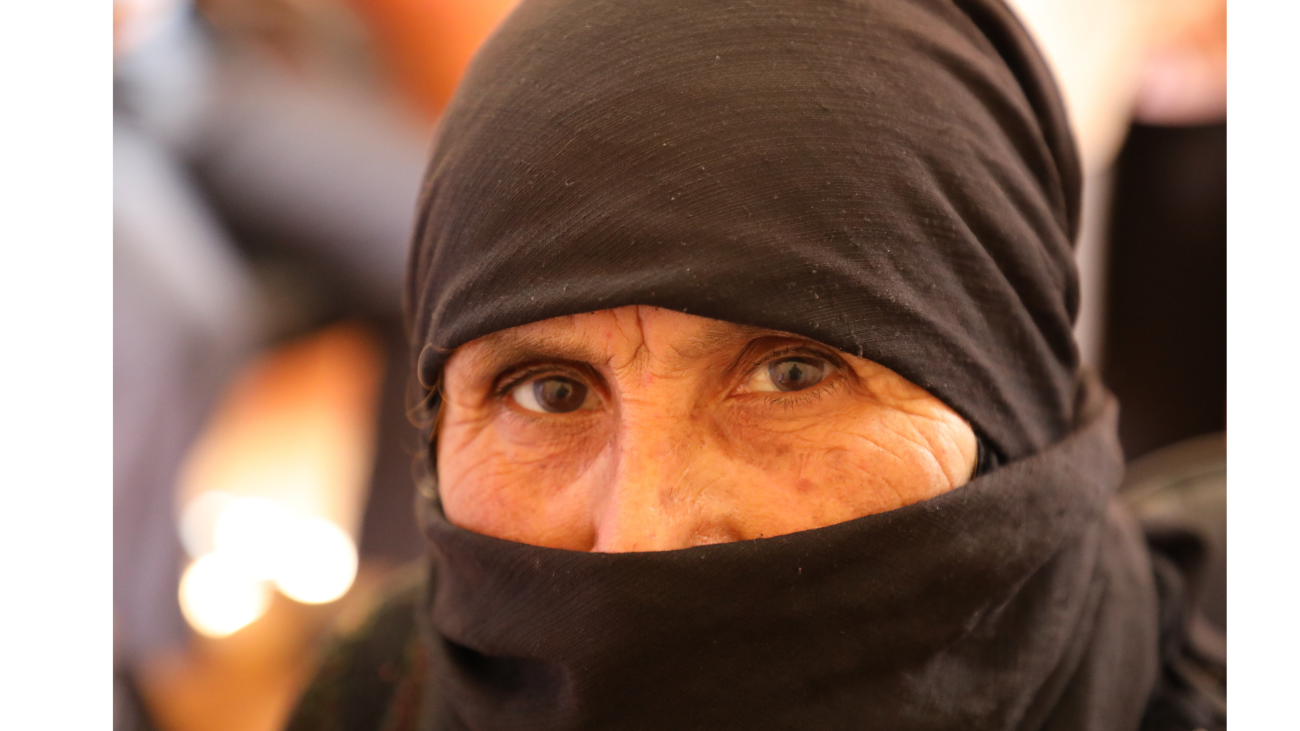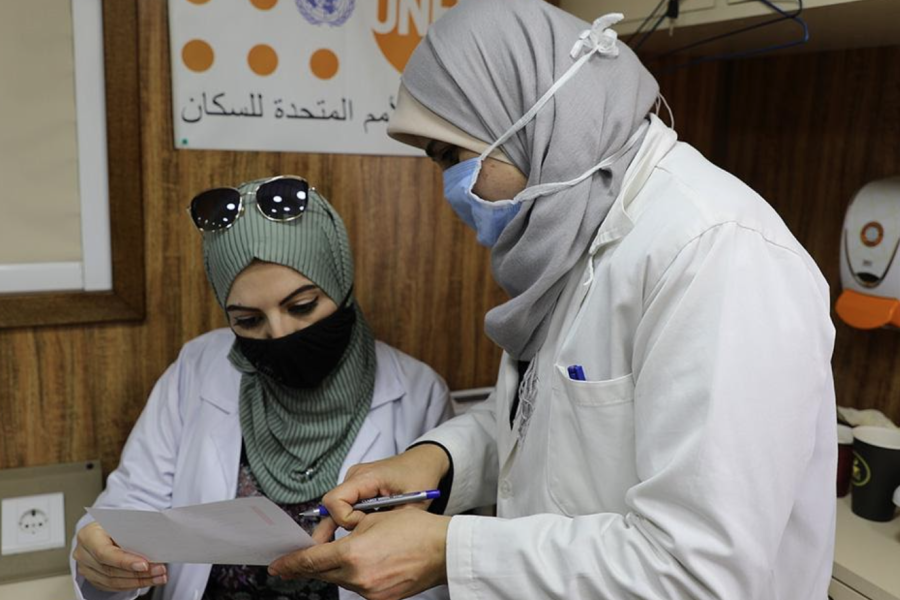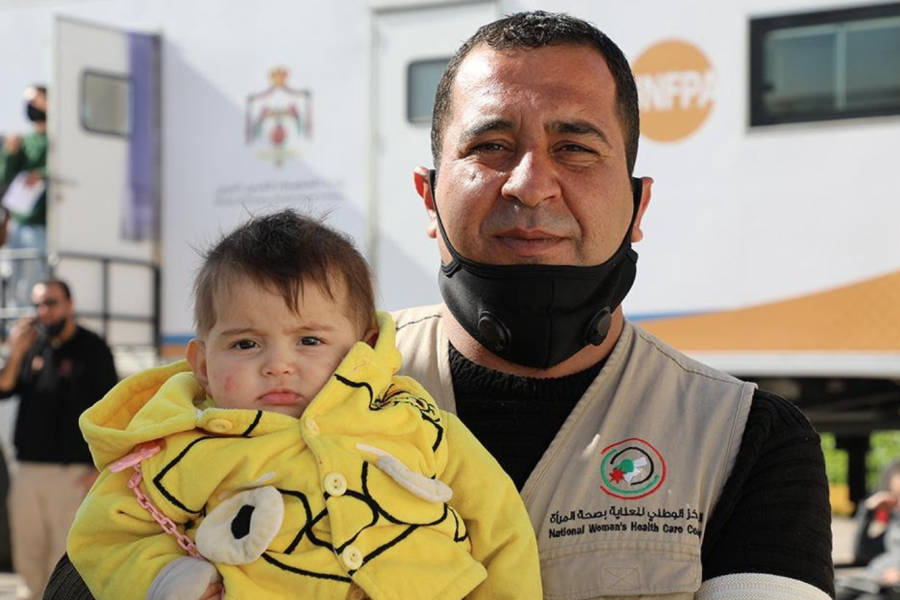Supported by UNFPA, a mobile clinic provides outstanding services in remote areas

Because everyone counts, and to leave no one behind.
Despite the exceptional medical services provided in both public and private facilities in Jordan, some rural areas spread across different parts of the country suffer from subpar medical services, especially regarding sexual and reproductive health. When the COVID-19 pandemic struck in 2020, it widened the gap in the provided medical services, particularly for the most vulnerable groups; those with low income, people with no medical insurance, refugees, and non-Jordanians.
This is why the idea of supporting this mobile clinic came about; because UNFPA believes in its pivotal role in strengthening the capacity of the national institutions to provide integrated Sexual and Reproductive Health (SRH) services and information, including maternal death surveillance and response, in both humanitarian and development settings.
In March 2020, the World Health Organization (WHO) declared COVID-19 a global pandemic. At a time where countries are struggling to respond to the rapid spread of the disease; the pandemic poses a grave in existing humanitarian crises and threatens to push fragile settings into new crises. The Jordanian Ministry of Health (MoH) has demonstrated its strong commitment to achieving common core capabilities in response to the pandemic. Yet, a significant impact of the epidemic on sexual and reproductive health has been observed.
It started in 2019 when UNFPA Jordan established a unique collation of key national partners to enhance the provision of Women-Friendly Health Services (WFHS) with the aim of improving high-quality, comprehensive SRH services and development of standards.
“As we strive to achieve zero preventable maternal deaths and zero unmet need for family planning by 2030, we are committed to continuing the support to our national counterparts to improve the health and well-being of mothers and babies, where ever they live.” Ms. Enshrah Ahmed, Head of UNFPA Jordan Country Office said
Ahmed added: “It is our collective responsibility to ensure that everyone, including those who are most vulnerable, disadvantaged and under-served, has access to high-quality and people-centered sexual and reproductive health rights including services and information. No one should be left behind.”
The mobile health clinic was commissioned in response to multiple assessments of the impact of COVID-19 on access to SRH services conducted by implementing partners. Consequently, UNFPA, in partnership with the National Woman's Health Care Center in Jordan, designed the mobile health clinic as an innovative intervention to respond to the gap in SRH services provided in remote areas.
The mobile clinic is designed to meet the needs of the most vulnerable women and mothers in remote areas in seven governorates. It consists of medically equipped teams with clinicians that offer reproductive health services, such as pregnancy tests, prenatal and postpartum care, gynecological exams, sexually transmitted infection (STI) screenings, health education, family planning supplies, and referrals to social services, especially services that may be difficult to reach in the remote areas. UNFPA and NWHCC, through mobile clinics, were able to reach at least 23,766 women, with a total of 42,427 integrated services in the field of sexual and reproductive health, including the provision of more than 15,610 counseling services on family planning. It also collaborates with hospitals, health care systems, and public health departments to create referrals for women in need of advanced services.
Muhammad Al-Oudat, Field Coordinator - UNFPA said: “The clinic provides many health services, including a gynecological clinic, early detection of breast and cervical cancer, early detection of osteoporosis, and various laboratory tests that include anemia examination.”
He added: “What makes this clinic a unique one is that it provides its services to everyone without exceptions, whether they are covered by health insurance or not, and whether they are Jordanians or not.”
The medically equipped mobile clinic comprises of doctors who provide reproductive health services, together with conducting pregnancy tests, providing pre-and post-natal care, gynecological examinations, sexually transmitted diseases tests, providing health awareness, and education services, family planning supplies, and referral to health and social services.

The clinic, which commenced its work at the beginning of July 2020, providing its services in remote areas in the various governorates of the Kingdom; in Irbid, Tafila, Karak, Maan, Aqaba, Shobak, Wadi Musa, and Madaba, through cooperation with government institutions, local associations, and civil society institutions in remote areas.
Khaled Al-Zawaida, a volunteer at Princess Basma Center and a person with a disability, who was visiting the clinic in the Disa area, said: mobile health clinic is of great importance for everyone, whether they are women, men, or even children as it provides many services. He said: “The importance of this type of clinic lies in its ability to reach remote places where such health services are unavailable. Therefore, residents are compelled to go to the nearest facility that provides these services. Such facilities are sometimes tens of kilometers away.”
He added: "As a person with disabilities, this has added a great burden and created a new problem that makes it impossible for me to reach health centers beyond the limits of the region due to the difficulty of transportation on one hand and my special condition on the other hand." He explained: "Since there is just one bus available to transport passengers from Disa area to Aqaba governorate, which is 70 kilometers away, and since the aforementioned bus departs at seven in the morning and returns at seven in the evening, as well as being a person with a disability, a special means of transportation to visit the health centers in Aqaba, is needed."
He expressed his hopes to see more services provided in these mobile clinics, such as dental services, in addition to services for people with disabilities such as physiotherapy.
The focus in mobile clinics is to provide health services to the most vulnerable population groups, such as low-income or uninsured individuals and refugees, whether in urban, rural, or remote areas, in partnership with hospitals, health care systems, and public health departments to refer women who want or need advanced medical services.
Tasnim Al Maghribi, Medical Campaigns Supervisor - The National Woman's Health Care Center, said: “The number of beneficiaries continues to rise and we are arriving at new sites every time according to demand and need.”
She also explained that the number of beneficiaries during the third quarter of 2020 (July, August, and September) had reached 710 Visitors to the gynecology clinic, 6,000 women benefited from family planning counseling and family planning methods, early detection of osteoporosis tests were conducted for 827 women and a total of 1178 laboratory tests. Al-Moghrabi added: “About 24 field visits were made, through which 19 remote areas were reached and the number of beneficiaries is expected to be the same during the fourth quarter.”
As soon as the clinic reaches the intended area, the team turns into a beehive of diligent and serious workers; from preparing the clinic to patients' reception, as every member of the team knows the role required of them, this is implemented professionally and skillfully in the shortest possible time; so that the clinic can provide services to the largest possible number of beneficiaries. The clinic does not leave the site until every last patient has received the necessary health services.

Dr. Alaa Al-Hanifat, a gynecologist and obstetrician, explained how the mobile clinic contains an advanced ultrasound device for pregnancy check-ups, where the tests are performed, and the required treatments are provided, in addition to medical advice regarding birth control. She highlighted the importance of enhancing awareness among the patients on issues related to their sexual and reproductive health and how it is of equal importance to the health services provided by the clinic. She further explained that she encountered some cases that required referral to advanced health services during her work in the clinic. She mentioned an instance where a patient using an IUD as a birth control method and had not been to a gynecologist in two years since installing the IUD. It was found that the IUD has punctured her cervix, which necessitated her referral to a hospital.
Rahima Salama, from Al-Risha area, southern Jordan, said: “I came to the clinic after knowing about it from social media and I visited the gynecological clinic and did an osteoporosis test in addition to some lab tests”.
She added that the presence of the clinic in her area saved her a lot of time and effort. Otherwise, she would have been forced to go to Aqaba governorate, which is about 80 kilometers away, to receive health services. That would mean she will spend a day going, returning, and receiving the required medical assistance, not to mention some of the challenges of finding someone to look after her young children until she returns from Aqaba. Finally, she hoped that the clinic visits to their area would be more frequent and more than once a month.
The Clinic is supported by United Nations Central Emergency Response Fund (CERF) and The Italian Development Cooperation.
Written by UNFPA Jordan.




